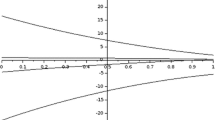Abstract
We approach the full fuzzy linear programming by grounding the definition of the optimal solution in the extension principle framework. Employing a Monte Carlo simulation, we compare an empirically derived solution to the solutions yielded by approaches proposed in the literature. We also propose a model able to numerically describe the membership function of the fuzzy set of feasible objective values. At the same time, the decreasing (increasing) side of this membership function represents the right (left) side of the membership function of the fuzzy set containing the maximal (minimal) objective values. Our aim is to provide decision-makers with relevant information on the extreme values that the objective function can reach under uncertain given constraints.
Access this chapter
Tax calculation will be finalised at checkout
Purchases are for personal use only
Similar content being viewed by others
References
Baykasoglu, A., Subulan, K.: An analysis of fully fuzzy linear programming with fuzzy decision variables through logistics network design problem. Knowl. Based Syst. 90, 165–184 (2015). https://doi.org/10.1016/j.knosys.2015.09.020
Baykasoglu, A., Subulan, K.: Constrained fuzzy arithmetic approach to fuzzy transportation problems with fuzzy decision variables. Expert Syst. Appl. 81, 193–222 (2017). https://doi.org/10.1016/j.eswa.2017.03.040
Bellman, R.E., Zadeh, L.A.: Decision-making in a fuzzy environment. Manage. Sci. 17(4), B—141–B–164 (1970). https://doi.org/10.1287/mnsc.17.4.B141
Bhardwaj, B., Kumar, A.: A note on ‘a new algorithm to solve fully fuzzy linear programming problems using the molp problem’. Appl. Math. Model. 39(19), 5982–5985 (2015). https://doi.org/10.1016/j.apm.2014.07.033
Buckley, J.J., Jowers, L.J.: Monte Carlo Methods in Fuzzy Optimization. Springer, Heidelberg (2008)
Das, S.K., Mandal, T., Edalatpanah, S.A.: A mathematical model for solving fully fuzzy linear programming problem with trapezoidal fuzzy numbers. Appl. Intell. 46, 509–519 (2017). https://doi.org/10.1007/s10489-016-0779-x
Dubois, D.: The role of fuzzy sets in decision sciences: old techniques and new directions. Fuzzy Sets Syst. 184(1), 3–28 (2011). https://doi.org/10.1016/j.fss.2011.06.003
Dubois, D., Prade, H.: Fuzzy sets and systems: theory and applications. In: Mathematics in Science and Engineering (1980)
Ezzati, R., Khorram, V., Enayati, R.: A new algorithm to solve fully fuzzy linear programming problems using the molp problem. Appl. Math. Model. 39(12), 3183–3193 (2015). https://doi.org/10.1016/j.apm.2013.03.014
Ghanbari, R., Ghorbani-Moghadam, K., De Baets, B.: Fuzzy linear programming problems: models and solutions. Soft Comput. (2019). https://doi.org/10.1007/s00500-019-04519-w
Kumar, A., Kaur, J., Singh, P.: A new method for solving fully fuzzy linear programming problems. Appl. Math. Model. 35(2), 817–823 (2011). https://doi.org/10.1016/j.apm.2010.07.037
Li, G., Kou, G., Peng, Y.: A group decision making model for integrating heterogeneous information. IEEE Trans. Syst. Man Cybern. Syst. 48(6), 982–992 (2018). https://doi.org/10.1016/j.ejor.2019.03.009
Liu, S.-T.: Fractional transportation problem with fuzzy parameters. Soft Comput. 20(3), 3629–3636 (2016). https://doi.org/10.1007/s00500-015-1722-5
Liu, S.-T., Kao, C.: Solving fuzzy transportation problems based on extension principle. Eur. J. Oper. Res. 153(3), 661–674 (2004). https://doi.org/10.1016/S0377-2217(02)00731-2
Morente-Molinera, J.A., Kou, G., Pang, C., Cabrerizo, F.J., Herrera-Viedma, E.: An automatic procedure to create fuzzy ontologies from users’ opinions using sentiment analysis procedures and multi-granular fuzzy linguistic modelling methods. Inf. Sci. 476, 222–238 (2019). https://doi.org/10.1016/j.ins.2018.10.022
Pérez-Cañedo, B., Concepción-Morales, E.R.: A method to find the unique optimal fuzzy value of fully fuzzy linear programming problems with inequality constraints having unrestricted l-r fuzzy parameters and decision variables. Expert Syst. Appl. 123, 256–269 (2019). https://doi.org/10.1016/j.eswa.2019.01.041
Pérez-Cañedo, B., Concepción-Morales, E.R.: On LR-type fully intuitionistic fuzzy linear programming with inequality constraints: solutions with unique optimal values. Expert Syst. Appl. 128, 246–255 (2019). https://doi.org/10.1016/j.eswa.2019.03.035
Stanojević, B., Dzitac, I., Dzitac, S.: On the ratio of fuzzy numbers - exact membership function computation and applications to decision making. Technol. Econ. Dev. Econ. 21(5), 815–832 (2015). https://doi.org/10.3846/20294913.2015.1093563
Stanojević, B., Dzitac, S., Dzitac, I.: Solution approach to a special class of full fuzzy linear programming problems. Procedia Comput. Sci. 162, 260–266 (2019). https://doi.org/10.1016/j.procs.2019.11.283
Zadeh, L.A.: Fuzzy sets. Inf. Control 8(3), 338–353 (1965). https://doi.org/10.1016/S0019-9958(65)90241-X
Zadeh, L.A.: The concept of a linguistic variable and its application to approximate reasoning I. Inf. Control 8(3), 199–249 (1975). https://doi.org/10.1016/0020-0255(75)90036-5
Zhang, H., Kou, G., Peng, Y.: Soft consensus cost models for group decision making and economic interpretations. Eur. J. Oper. Res. 277(3), 964–980 (2019). https://doi.org/10.1016/j.ejor.2019.03.009
Zimmermann, H.-J.: Fuzzy programming and linear programming with several objective functions. Fuzzy Sets Syst. 1(1), 45–55 (1978). https://doi.org/10.1016/0165-0114(78)90031-3
Zimmermann, H.-J.: Applications of fuzzy set theory to mathematical programming. Inf. Sci. 36(1), 29–58 (1985). https://doi.org/10.1016/0020-0255(85)90025-8
Acknowledgments
This work was supported by the Serbian Ministry of Education, Science and Technological Development through Mathematical Institute of the Serbian Academy of Sciences and Arts and Faculty of Organisational Sciences of the University of Belgrade.
Author information
Authors and Affiliations
Corresponding author
Editor information
Editors and Affiliations
Rights and permissions
Copyright information
© 2021 Springer Nature Switzerland AG
About this paper
Cite this paper
Stanojević, B., Stanojević, M. (2021). Empirical Versus Analytical Solutions to Full Fuzzy Linear Programming. In: Dzitac, I., Dzitac, S., Filip, F., Kacprzyk, J., Manolescu, MJ., Oros, H. (eds) Intelligent Methods in Computing, Communications and Control. ICCCC 2020. Advances in Intelligent Systems and Computing, vol 1243. Springer, Cham. https://doi.org/10.1007/978-3-030-53651-0_19
Download citation
DOI: https://doi.org/10.1007/978-3-030-53651-0_19
Published:
Publisher Name: Springer, Cham
Print ISBN: 978-3-030-53650-3
Online ISBN: 978-3-030-53651-0
eBook Packages: EngineeringEngineering (R0)




